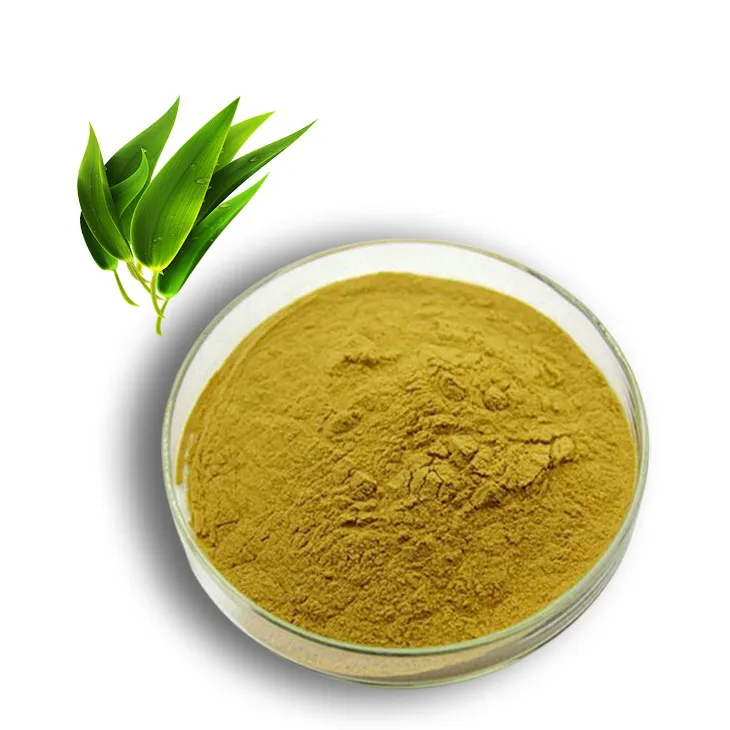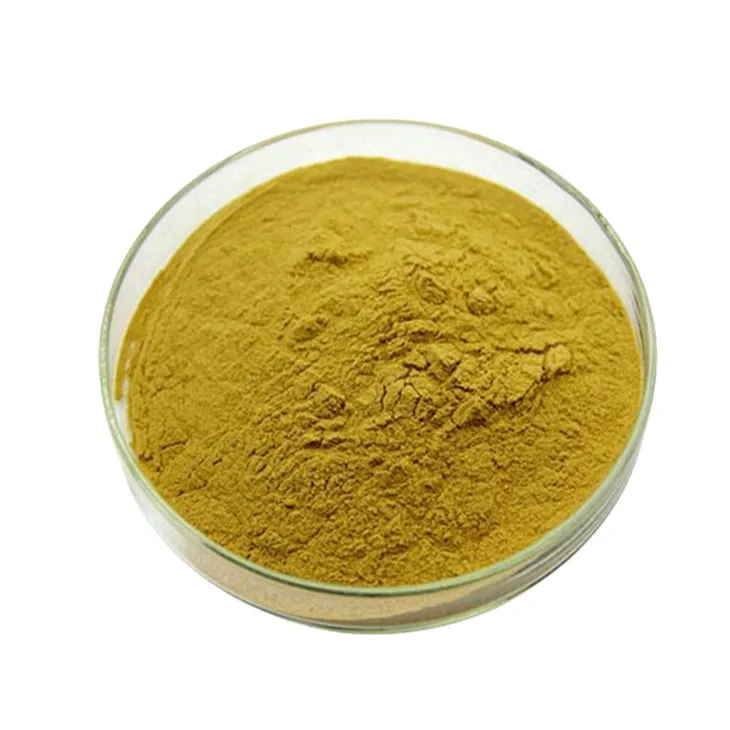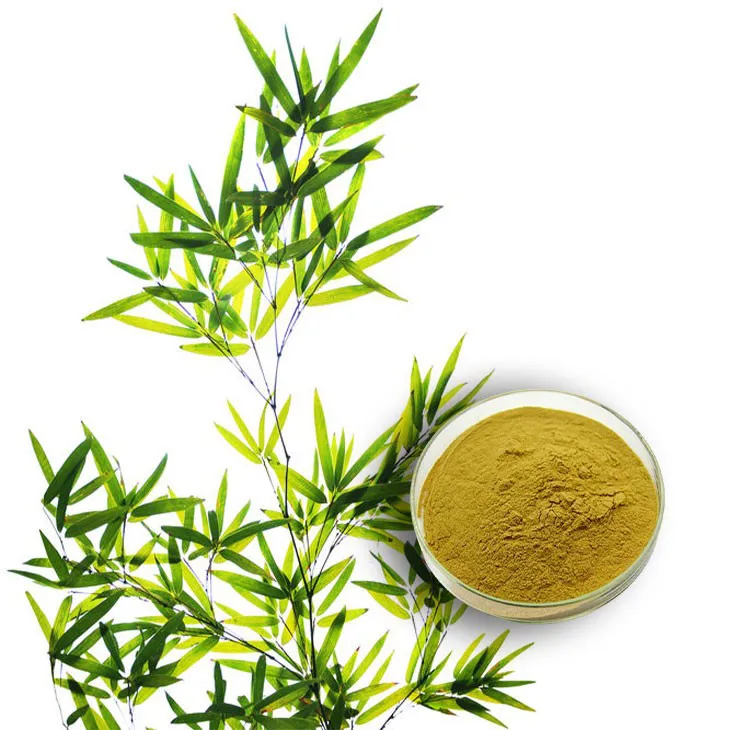- 0086-571-85302990
- sales@greenskybio.com
Fertilizer and Feed Components in Bamboo Leaf Extracts
2024-12-01

1. Introduction
Bamboo is a widespread and versatile plant that has been an important part of human life for centuries. Bamboo leaves, in particular, are a rich source of various components that can be harnessed for use in fertilizers and feeds. This article will explore the valuable components of Bamboo Leaf extracts and their potential applications in enhancing plant growth in fertilizers and improving livestock health as feed ingredients.

2. Nutrients in Bamboo Leaf extracts
2.1 Macronutrients
Bamboo Leaf extracts contain significant amounts of macronutrients that are essential for plant growth. Nitrogen (N), for example, is a crucial component for the synthesis of proteins and chlorophyll in plants. It helps in promoting vegetative growth, making plants greener and more vigorous. Phosphorus (P) is another macronutrient present in bamboo leaf extracts. It is involved in energy transfer processes within the plant cells, such as in photosynthesis and respiration. Adequate phosphorus is necessary for root development, flowering, and fruiting. Potassium (K) also plays a vital role. It helps in regulating water uptake and transpiration in plants, and also improves their resistance to diseases and environmental stresses.
2.2 Micronutrients
In addition to macronutrients, bamboo leaf extracts are also a source of micronutrients. Iron (Fe), for instance, is essential for the formation of chlorophyll. Without sufficient iron, plants may develop chlorosis, a condition where the leaves turn yellow due to a lack of chlorophyll. Manganese (Mn) is involved in various enzymatic reactions in plants. Zinc (Zn) is necessary for the synthesis of growth hormones in plants. These micronutrients, although required in small amounts, are crucial for the overall health and proper growth of plants.

3. Bioactive Substances in Bamboo Leaf Extracts
3.1 Flavonoids
Flavonoids are one of the major bioactive substances present in bamboo leaf extracts. They have antioxidant properties, which means they can protect plant cells from damage caused by free radicals. Free radicals are highly reactive molecules that can be generated during normal plant metabolic processes or due to environmental factors such as pollution and UV radiation. By scavenging these free radicals, flavonoids can help plants maintain their cellular integrity and function. Flavonoids may also play a role in plant - pathogen interactions. They can induce the plant's defense mechanisms against diseases, making the plants more resistant to infections.
3.2 Phenolic Compounds
Phenolic compounds are another group of bioactive substances in bamboo leaf extracts. These compounds have antimicrobial properties, which can help in suppressing the growth of harmful microorganisms in the soil when used as a fertilizer component. In feeds, phenolic compounds may have a positive impact on livestock health by improving gut health. They can inhibit the growth of pathogenic bacteria in the gut, thus reducing the risk of diseases in livestock.

4. Benefits of Bamboo Leaf Extracts in Fertilizers
4.1 Enhanced Plant Growth
The nutrients and bioactive substances in bamboo leaf extracts can work together to enhance plant growth. The macronutrients and micronutrients provide the necessary building blocks for plant development, while the bioactive substances such as flavonoids and phenolic compounds can protect plants from environmental stresses and diseases. For example, plants treated with bamboo leaf extract - based fertilizers may show increased height, more extensive root systems, and a greater number of leaves and flowers compared to untreated plants.
4.2 Improved Soil Quality
When bamboo leaf extracts are used as fertilizers, they can also improve soil quality. The organic matter in the extracts can enhance soil structure, making it more porous and better able to retain water and nutrients. This can create a more favorable environment for soil microorganisms, which play a crucial role in nutrient cycling and soil fertility. Additionally, the antimicrobial properties of the phenolic compounds in the extracts can help in reducing the population of harmful soil - borne pathogens.

5. Benefits of Bamboo Leaf Extracts in Feeds
5.1 Nutritional Value
Bamboo leaf extracts can add nutritional value to livestock feeds. The nutrients present in the extracts, such as proteins, vitamins, and minerals, can supplement the diet of livestock. For example, in some regions where forage quality is poor, adding bamboo leaf extracts to the feed can provide additional sources of essential nutrients, helping to improve the overall health and productivity of livestock.
5.2 Health Promotion
The bioactive substances in bamboo leaf extracts can also promote livestock health. As mentioned earlier, phenolic compounds can improve gut health by inhibiting the growth of pathogenic bacteria. Flavonoids may have antioxidant effects in livestock, protecting their cells from oxidative damage. This can lead to reduced incidences of diseases, improved growth rates, and better meat quality in livestock.
6. Potential Applications of Bamboo Leaf Extracts
6.1 Organic Fertilizers
One of the main potential applications of bamboo leaf extracts is in the production of organic fertilizers. With the increasing demand for organic farming, bamboo leaf extracts can be a valuable source of natural nutrients and bioactive substances. They can be used alone or in combination with other organic materials such as compost and manure to create effective organic fertilizers. These fertilizers can be applied to a wide range of crops, including vegetables, fruits, and grains.
6.2 Livestock Feed Supplements
Bamboo leaf extracts can also be developed into livestock feed supplements. In the livestock industry, there is a continuous need for high - quality feed ingredients that can improve animal health and productivity. Bamboo leaf extracts can be processed into different forms, such as powders or pellets, and added to livestock feeds. This can be especially beneficial for small - scale farmers who may have limited access to high - quality feed ingredients.
7. Conclusion
In conclusion, bamboo leaf extracts are a rich source of nutrients and bioactive substances that have great potential for use in fertilizers and feeds. The nutrients can support plant growth and livestock health, while the bioactive substances can provide additional benefits such as protection from environmental stresses and diseases. With further research and development, bamboo leaf extracts can be more effectively utilized in the agricultural and livestock industries, contributing to more sustainable and productive farming systems.
FAQ:
What are the main nutrients in bamboo leaf extracts for fertilizers?
Bamboo leaf extracts for fertilizers often contain nutrients such as nitrogen, phosphorus, potassium, and various micronutrients like iron, manganese, and zinc. Nitrogen is essential for plant growth and leaf development. Phosphorus is crucial for root development and energy transfer within the plant. Potassium helps in overall plant vigor, disease resistance, and water regulation.
How can bioactive substances in bamboo leaf extracts improve livestock health as a feed ingredient?
The bioactive substances in bamboo leaf extracts may have antioxidant, antibacterial, and anti - inflammatory properties. Antioxidants can help reduce oxidative stress in livestock, which is beneficial for their overall health. The antibacterial properties can help prevent certain diseases caused by bacteria in the digestive tract. Anti - inflammatory substances can reduce inflammation in the body, which is important for maintaining normal physiological functions in livestock.
What are the potential applications of bamboo leaf extracts in fertilizers?
Bamboo leaf extracts can be used in various types of fertilizers. They can be added to organic fertilizers to enhance their nutrient content and improve the quality of soil. In liquid fertilizers, they can provide a quick - acting source of nutrients for plants. They can also be used in foliar fertilizers, which are sprayed directly onto plant leaves for rapid absorption and growth promotion.
How do bamboo leaf extracts enhance plant growth in fertilizers?
The nutrients and bioactive substances in bamboo leaf extracts play important roles in plant growth. The nutrients directly supply the necessary elements for plant development. The bioactive substances may stimulate plant hormones, improve root absorption capacity, and enhance the plant's resistance to environmental stresses such as drought and disease, thus promoting overall plant growth.
Are there any limitations or challenges in using bamboo leaf extracts for fertilizers and feeds?
One limitation may be the extraction process. Ensuring efficient extraction of the valuable components without losing their activity can be challenging. In terms of application as a feed ingredient, there may be concerns about dosage control to avoid any potential negative effects on livestock health. For fertilizers, compatibility with other fertilizer components and soil types needs to be carefully considered to ensure optimal effectiveness.
Related literature
- Analysis of Nutrient Components in Bamboo Leaf Extracts for Agricultural Applications"
- "Bioactive Substances in Bamboo Leaf Extracts: Implications for Livestock Feed"
- "The Role of Bamboo Leaf Extracts in Organic Fertilizer Formulations"
- ▶ Hesperidin
- ▶ Citrus Bioflavonoids
- ▶ Plant Extract
- ▶ lycopene
- ▶ Diosmin
- ▶ Grape seed extract
- ▶ Sea buckthorn Juice Powder
- ▶ Fruit Juice Powder
- ▶ Hops Extract
- ▶ Artichoke Extract
- ▶ Mushroom extract
- ▶ Astaxanthin
- ▶ Green Tea Extract
- ▶ Curcumin
- ▶ Horse Chestnut Extract
- ▶ Other Product
- ▶ Boswellia Serrata Extract
- ▶ Resveratrol
- ▶ Marigold Extract
- ▶ Grape Leaf Extract
- ▶ New Product
- ▶ Aminolevulinic acid
- ▶ Cranberry Extract
- ▶ Red Yeast Rice
- ▶ Red Wine Extract
-
Uridine-5'-monophosphate Disodium salt
2024-12-01
-
Rose Hip Extract
2024-12-01
-
White mustard seed extract
2024-12-01
-
Peppermint Oil
2024-12-01
-
Tongkat Ali Extract Powder
2024-12-01
-
Chaste Berry Extract
2024-12-01
-
Horse Chestnut Extract
2024-12-01
-
Lemon Extract
2024-12-01
-
Angelica sinensis extract
2024-12-01
-
Rosemary extract
2024-12-01





















